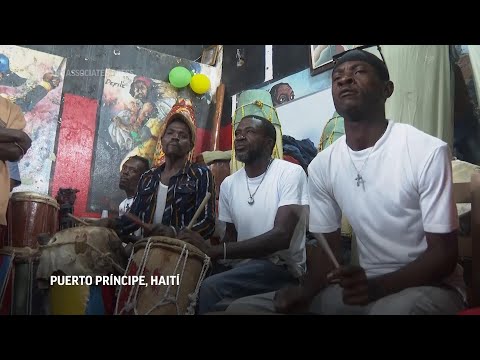(10 May 2024)
RESTRICTION SUMMARY:
ASSOCIATED PRESS
Puerto Príncipe, Haití – 5 de mayo de 2024
1. Varias de un hombre tocando tambores
3. Varias de mujeres bailando y practicantes de vudú en trance
4. SOUNDBITE (creole haitiano) Cecil Elien Isac, sacerdote vudú:
++IMAGES OVER SOUNDBITE ++
"Cada nación, cada pueblo tiene un nombre para su tierra, su historia, su cultura y su religión. Somos haitianos y nuestra cultura y nuestra alma es el vudú."
5. Varias de hombres con velas y maracas, practicando rituales vudú
6. Una mujer sosteniendo platos y cantando al ritmo de los tambores
7. Varias de ofrendas a los espíritus en un altar
8. SOUNDBITE (creole haitiano) Cecil Elien Isac, sacerdote vudú:
"Hoy el vudú es diferente. Es un vudú limpio y puro, es filosofía, espiritualidad y magia. El vudú está en la educación, la economía, la vida social, la política y mucho más."
9. Varias de personas cantando, bailando al ritmo de los tambores
STORYLINE:
They sing, their voices rising above the gunfire erupting miles away as the frantic drumbeats drown out their troubles.
On a recent afternoon, hundreds of Vodou practioners gathered In a small church to celebrate St. George, a Christian martyr believed to be a Roman soldier who is revered by Catholics and Vodouists alike.
They offered him money and prayers in hopes they would make it through Haiti’s deepening crisis.
“We don’t care if they hate us, because they can’t bury us,” they sang in Haitian Creole.
Shunned publicly by politicians and intellectuals for centuries, Vodou is transforming into a more powerful and accepted religion across Haiti where its believers were once persecuted as people seek solace and protection from violent gangs that have killed, raped, and kidnapped thousands in recent years.
Amid the spiralling chaos, a growing number of Haitians are praying more or visiting Vodou priests known as oungans for urgent requests ranging from locating loved ones who were kidnapped to finding critical medication needed to keep someone alive.
Vodou was at the root of the revolution that led Haiti to become the world’s first free Black republic, a religion born in West Africa and brought across the Atlantic by slaves.
The syncretic religion that melds Catholicism with animist beliefs has no official leader or creeds. It has a single God known as “Bondye,” Creole for “Good God,” and more than a thousand spirits known as “lwas,” some that aren’t always benevolent.
During Vodou ceremonies, lwas are offered everything from papayas to coffee and even popcorn, lollipops and cheese puffs on occasion, and a ceremony is considered successful if a Vodouist is possessed by a lwa.
In recent years Vodou has been attracting more believers given the surge in gang violence and government inaction, said Cecil Elien Isac, a 4th-generation oungan.
When Isac opened his temple years ago in Port-au-Prince, about eight families in the area became members. Now he counts more than 4,000, both in Haiti and abroad.
It has since become a key ingredient in Haiti’s rich cultural scene, inspiring music, art, writing and dance.
It’s unknown how many people currently practice Vodou in Haiti, but there’s a popular saying: "Haiti is 70% Catholic, 30% Protestant, and 100% Vodou."
While Vodou also has countless lwas or spirits, Ogou Je Wouj, or the god of red eyes, a manifestation of the god of war, has grown more significant to Haitians given the lack of security in the country.
AP video by Pierre Luxama
===========================================================
Find out more about AP Archive: http://www.aparchive.com/HowWeWork
Twitter: https://twitter.com/AP_Archive
Facebook: https://www.facebook.com/APArchives
Instagram: https://www.instagram.com/APNews/
You can license this story through AP Archive: http://www.aparchive.com/metadata/youtube/0d5d441a412540e9b8da613c635a9033





